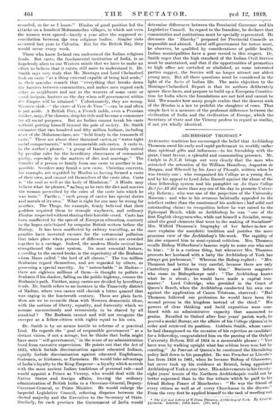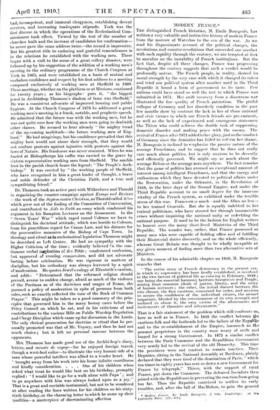ARCHBISHOP THOMSON.*
ANECDOTIC tradition has encouraged the belief that Archbiahop Thomson owed his early and rapid preferment to worldly rather than spiritual gifts and influences—to his friendship with the great, Court favour, a splendid and commanding presence. Mr. Carlyle in D.N.B. brings out very clearly that the man who attracted the attention of Sir William Hamilton, Augustus tie Morgan, and Whewell by his Laws of Thought, written when he was twenty-one ; who reorganized his College as a young don, and by his appeal to Lord John Russell against the abuse of the close fellowship system and his pamphlet on An Open College Best for All did more than any one of his day to promote Univer- sity Reform ; who was one of the projectors of the University Museum ; and who in his sermons habitually appealed to the intellect rather than the emotionsof his audience; had solid and outstanding claims to recognition before he was raised to the Episcopal Bench, while as Archbishop he was "one of the first English clergymen who, while not himself a Socialist, recog- nized the good elements that went to the making of Socialiser' Mrs. Wilfrid Thomson's biography of her father-in-law at once explains the anecdotic tradition and justifies the more generous view of the Archbishop's life-work. The rapidity of his rise exposed him to semi-cynical criticism. Mrs. Thomson recalls Bishop Wilberforce's famous reply to some one who said to him : " It is a curious thing, but whenever Mrs. Thomson presents her husband with a baby the Archbishop of York has always got preferment." Whereon the Bishop replied : "Mrs. Thomson had better be very careful, because there are only Canterbury and Heaven before him." Business magnates who came to Bishopthorpe said : "The Archbishop knows what he is about ; he would have made a capital iron- master." Lord Coleridge, who presided in the Court of Queen's Bench, when the Archbishop conducted his own case against the application of Canon Tristram, observed : "Had Thomson followed our profession he would have been the second person in the kingdom instead of the third." His powers of clear thinking and lucid exposition were com- bined with an administratve capacity that amounted to genius. Recalled to Oxford after four years' parish work, he proved a model Bursar, set the affairs of his College (Queen's) in order and retrieved its position. Goldwin Smith, whose cause he had championed on the occasion of his rejection as candidate for a fellowship, congratulated him on the passing of the Oxford University Reform Bill of 1854 in a memorable phrase : "You have won by walking upright what has seldom been won but by crawling." As Provost of Queen's he continued the liberalizing policy laid down in his pamphlet. He was Preacher at Lincoln's Inn from 1858 to 1861, when he became Bishop of Gloucester, but never took up his residence at Bristol, being appointed Archbishop of York a year later. His achievements in his twenty- eight years' tenure of the Northern Archbishopric could not be better expressed than in the fine tribute 'wblelche paid to his friend Bishop Fraser of Manchester : "He was the friend of every citizen as well as of every Churchman in the diocese." From the very first he applied himself-to the task of weeding out • The Life and Letters of William Thomson, Archbishop of Ark. Sly Ethel II. Dioceses. London; DAM lace, 1113s. slet.1
bad, incompetent, and immoral clergymen, establishing decent services, and increasing inadequate stipends. York was the first diocese in which the operations of the Ecclesiastical Com- missioners took effect. Viewed by the test of the number of churches built and the increase of candidates for confirmation— he never gave the same address twice—the record is impressive. But his greatest title to enduring and grateful remembrance is in the relations he established with the working men. These began with a visit to the scene of a great collery disaster, were followed up by his suggestion of the addition of a working men's meeting to the ordinary programme of the Church Congress at Vork in 1865, and were established on a basis of mutual and unshaken confidence and respect by his first address to a meeting composed exclusively of working men at Sheffield in 1869. These meetings, whether on the platform or at Missions, continued for twenty years ; as his biographer puts it, " the biggest jewel in Archbishop Thomson's diadem of fame was Sheffield." He was a consistent advocate of improved housing and public hygiene. At the Church Congress of 1878 he addressed a great working men's meeting in a frank, notable, and prophetic speech. He admitted that the future was with the working men, but he was not quite sum how the working men were going to deal with other classes. He seemed to hear already " the mighty tread of the up-coming multitude—the future working men of Eng- land." He had misgivings, but his confidence prevailed that this mighty host would not abuse their strength, that they would not confuse protests against injustice with protests against the laws of Nature. His frankness was never resented. When he was buried at Bishopthorpe his coffin was carried to the grave by sixteen representative working men from Sheffield. The marble Mist in the parish church bears the legend: "The People's Arch- bishop." It was erected by " the working people of Sheffield, who have recognized in him a great leader of thought, a brave and noble defender of the Christian Faith, and a true and sympathizing friend."
Dr. Thomson took an active part with Wilberforce and Thorold in organizing the counter-campaign against Essays and Reviews —the work of the Septent contra Christunt, as Thorold called it !— which grew out of the finding of the Committee of Convocation, and contributed to Aids to Fault an essay which condensed his argument in his Bampton Lectures on the Atonement. In the " Seven- Years' War " which raged round Colenso we have to distinguish his doctrinal attitude, which was hostile to Colenso, from his punctilious regard for Canon Law, and his distaste for the provocative measures of the Bishop of Cape Town. In theology and ritual as in ecclesiastical legislation Thomson might be described as Left Centre. He had no sympathy with the Higher Criticism of the time ; evidently believed i n the con- tinuous verbal inspiration of tke Bible ; condemned confession, but approved of evening communion, and did not advocate fasting before celebration. He was rigorous in matters of discipline, but his orthodoxy was always leavened by a spirit of moderation. He quotes Jewel's eulogy of Elizabeth's caution, and adds : " Determined that the reformed religion should prevail, averse to sudden change, afraid as much of the violence of the Puritans as of the doctrines and usages of Rome, she pursued a policy of moderation in spite of pressure from both sides, such as exactly reflected the tone of the Book of Common Prayer." This might be taken as a good summary of the prin. ciples that governed him in the many heresy cases before the Privy Council on which he sat, and in his criticisms of and contributions to the various Bills on Public Worship Regulation and Clergy Discipline which came up for discussion in the Lords. The only clerical prosecution for doctrine or ritual that he per- sonally promoted was that of Mr..Voysey, and then he had not much choice ; but it left no personal rancour between the opponents.
Mrs. Thomson has made good use of the Archbishop's diary, letters, and carnets de voyage—for he enjoyed foreign travel, though a wretched sailor—to illustrate the very human side of a man whose powerful intellect was allied to a tender heart. He brought away from his work into his home infinite courtliness and kindly consideration. . . . One of his children when asked what treat he would like beat on his birthday, promptly replied : ' I would like to go for a walk alone with Papa' ; and to go anywhere with him was always looked upon as a joy." That is a great and enviable testimonial, but not to be wondered at after reading the lines written for his children on his sixty- sixth birthday, or the charming letter in which he sums up their qualities—a masterpiece of discriminating affection




































 Previous page
Previous page